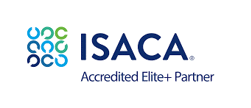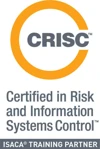Let’s make it work for you
From £3,450 + VAT
- SFIA
Skills Framework for the Information Age (SFIA) identifies and describes over 100 skills and 7 levels of job roles. To find out more, read What is SFIA?
Interested in this course? Check out when this course is running and get in touch
Overview
This four-day official ISACA course equips learners with the knowledge and practical skills needed to prepare for and pass the CRISC exam. CRISC is the only globally recognised certification focused on IT and enterprise risk management, enabling professionals to bridge the gap between risk, business goals, and technology. Participants will explore the four CRISC domains: governance, risk assessment, risk response and reporting, and technology and security. Through real-world scenarios and exam-focused exercises, learners will gain the ability to identify, assess, and manage IT risks while supporting enterprise objectives.
As an official ISACA partner, we provide the latest authorised courseware and access to the Questions, Answers & Explanations Database 2025, ensuring a comprehensive and up-to-date learning experience.
Prerequisites
Learners should have:
- At least three years of professional experience in IT risk management or control, covering a minimum of two CRISC domains (including governance or risk assessment).
- Familiarity with risk frameworks, organisational governance, and control processes.
Target Audience
This course is designed for:
- IT risk and compliance professionals seeking CRISC certification
- Business analysts, project managers, and auditors involved in risk activities
- IT managers, information security officers, and governance specialists responsible for risk oversight
Learning Outcomes
By the end of this course, learners will be able to:
- Explain the governance structures, frameworks, and cultural factors that shape IT risk management.
- Identify, evaluate, and prioritise IT risks using established assessment methodologies.
- Develop and implement risk response strategies aligned with enterprise objectives.
- Design, monitor, and assess IT controls for effectiveness and maturity.
- Report relevant risk and control information to stakeholders to support decision making.
- Recognise the impact of emerging technologies, regulations, and security practices on enterprise risk.
- Apply exam strategies and practice techniques to prepare for the CRISC exam.
Course Outline
Introduction to the CRISC exam
- About the CRISC certification
- Exam structure, scoring, and preparation strategies
Domain 1 – Governance
- Strategy, goals, and objectives
- Organisational structure, culture, ethics, and accountability
- Risk appetite, tolerance, and enterprise risk frameworks
- Policies, standards, legal and regulatory requirements
- Maintaining risk registers and profiles
- Stakeholder communication and reporting
Domain 2 – Risk assessment
- Risk event identification and threat modelling
- Vulnerability management and scenario development
- Business impact analysis and residual risk evaluation
- Risk analysis methodologies and risk register updates
- Promoting a risk-aware culture through awareness and training
Domain 3 – Risk response and reporting
- Risk response options and treatment planning
- Control design, selection, and implementation
- Issue, finding, and exception management
- Vendor and supply chain risk management
- Monitoring and analysing KPIs, KRIs, and KCIs
- Reporting emerging risks to stakeholders
Domain 4 – Technology and security
- Technology roadmaps and enterprise architecture
- IT operations, lifecycle management, and disaster recovery
- Security frameworks, standards, and awareness training
- Data lifecycle management, privacy, and protection
- Emerging technologies and their risk implications
Exam readiness
- Mock exam review
- Time management and test-taking strategies
Exams and Assessments
This course prepares learners for the CRISC exam. The exam is booked separately via ISACA and delivered online. It consists of 150 multiple-choice questions over four hours. A passing score of 450 (out of 800) is required. Practice questions and mock tests are included during the course.
CRSIC exam changes from 3rd Nov 2025, the four CRISC domains remain the same, but the distribution of the exam content will slightly change to the following:
Domain 1: Governance (26 percent)
Domain 2: Risk Assessment (22 percent, compared to 20 percent previously)
Domain 3: Risk Response and Reporting (32 percent)
Domain 4: Technology and Security (20 percent, compared to 22 percent previously)
Hands-On Learning
Learners will engage in:
- Scenario-based group exercises and tabletop simulations
- Risk register development and analysis workshops
- Mock exam practice with guided review from instructors
- Case studies reflecting real-world enterprise risk challenges


QA is proud to be an official ISACA partner.

QA is an approved training provider for ELCAS, proud to support service leavers in their transition into the tech industry. Learn more about Elcas approved training here.
For commercials please refer to:
or the ELCAS Portal.
Why choose QA
- Award-winning training, top NPS scores
- Over 500,000 learners in 2024
- Our training experts are industry leaders
- Read more about QA
Special Notices
To help with your studies, you will receive the following when you attend this course with QA:
- ISACA CRISC Review 8th Edition Manual (eBook)
- ISACA CRISC Exam Prep Tool
- ISACA CRISC Exam Voucher
To see all our ISACA courses, please click here.
Cyber Security learning paths
Want to boost your career in cyber security? Click on the roles below to see QA's learning pathways, specially designed to give you the skills to succeed.
Governance, Risk & Compliance learning paths
Want to boost your career in Governance, Risk & Compliance? View QA's learning pathway below, specially designed to give you the skills to succeed.

Frequently asked questions
How can I create an account on myQA.com?
There are a number of ways to create an account. If you are a self-funder, simply select the "Create account" option on the login page.
If you have been booked onto a course by your company, you will receive a confirmation email. From this email, select "Sign into myQA" and you will be taken to the "Create account" page. Complete all of the details and select "Create account".
If you have the booking number you can also go here and select the "I have a booking number" option. Enter the booking reference and your surname. If the details match, you will be taken to the "Create account" page from where you can enter your details and confirm your account.
Find more answers to frequently asked questions in our FAQs: Bookings & Cancellations page.
How do QA’s virtual classroom courses work?
Our virtual classroom courses allow you to access award-winning classroom training, without leaving your home or office. Our learning professionals are specially trained on how to interact with remote attendees and our remote labs ensure all participants can take part in hands-on exercises wherever they are.
We use the WebEx video conferencing platform by Cisco. Before you book, check that you meet the WebEx system requirements and run a test meeting to ensure the software is compatible with your firewall settings. If it doesn’t work, try adjusting your settings or contact your IT department about permitting the website.
How do QA’s online courses work?
QA online courses, also commonly known as distance learning courses or elearning courses, take the form of interactive software designed for individual learning, but you will also have access to full support from our subject-matter experts for the duration of your course.
Once you have purchased the Online course and have completed your registration, you will receive the necessary details to enable you to immediately access it through our e-learning platform and you can start to learn straight away, from any compatible device. Access to the online learning platform is valid for one year from the booking date.
All courses are built around case studies and presented in an engaging format, which includes storytelling elements, video, audio and humour. Every case study is supported by sample documents and a collection of Knowledge Nuggets that provide more in-depth detail on the wider processes.
When will I receive my joining instructions?
Joining instructions for QA courses are sent two weeks prior to the course start date, or immediately if the booking is confirmed within this timeframe. For course bookings made via QA but delivered by a third-party supplier, joining instructions are sent to attendees prior to the training course, but timescales vary depending on each supplier’s terms. Read more FAQs.
When will I receive my certificate?
Certificates of Achievement are issued at the end the course, either as a hard copy or via email. Read more here.
Let's talk
A member of the team will contact you within 4 working hours after submitting the form.